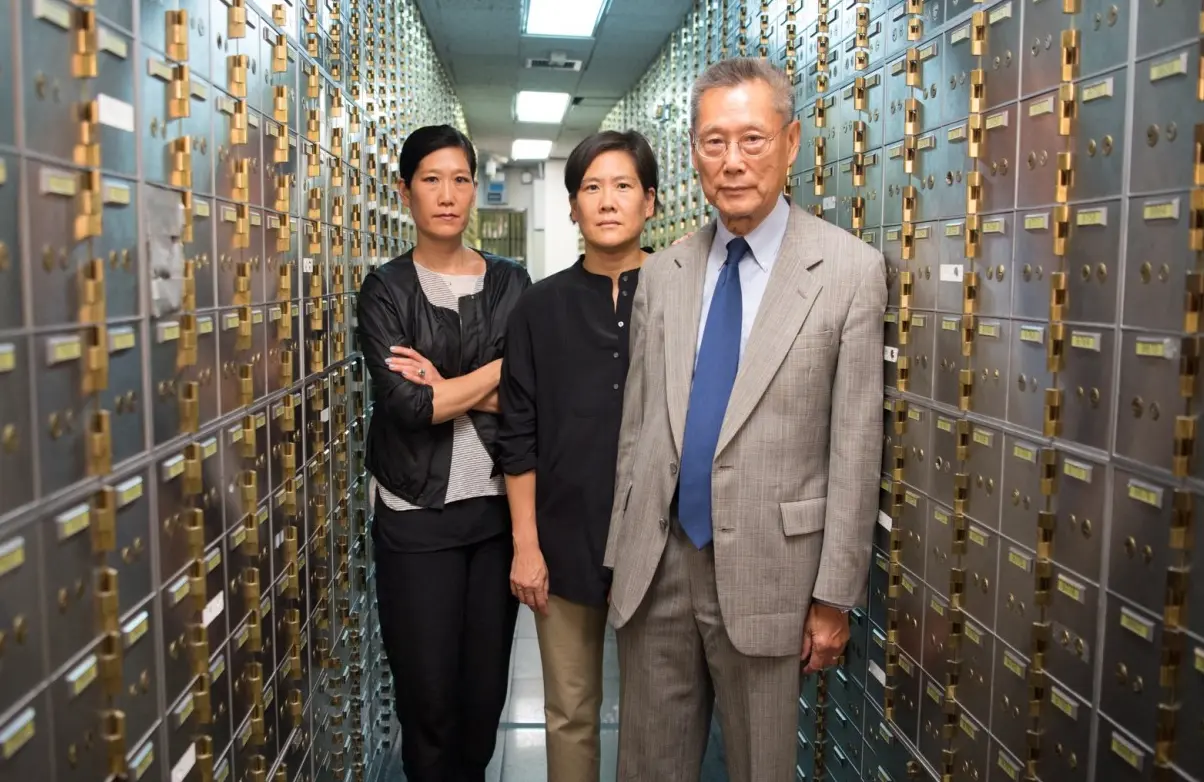The Justice System Is Held Accountable in Abacus: Small Enough to Jail
-
 Vera Sung, Jill Sung, and Thomas Sung of Abacus Federal Savings Bank, in a promotional image for <i>Abacus: Small Enough to Jail</i>. (PBS)
Vera Sung, Jill Sung, and Thomas Sung of Abacus Federal Savings Bank, in a promotional image for <i>Abacus: Small Enough to Jail</i>. (PBS)Abacus: Small Enough to Jail
Aired 2017 on Frontline
Watch on PBS.orgThe greatest U.S. government failure of the 21st century wasn’t 9/11, wasn’t Katrina, and certainly wasn’t Benghazi or Russiagate. It was the ruination of millions of American dreams in the collapse of the subprime housing loan market of 2008. The collapse itself was widely covered, since it was seen (rightly) as the chief cause of the global recession of 2008-2010. Michael Lewis, as he often does, somehow managed to animate the obscure market dynamics behind this house of cards, first as a book and then a major motion picture, both called The Big Short.
And then everyone moved on.
Everyone, that is, but Cy Vance, the district attorney for the Southern District of New York. In 2012 Vance brought charges against a New York City bank charging it with mortgage fraud in the aftermath of the subprime collapse. Was this bank Chase or Wells Fargo or Countrywide or WaMu, each of which kept extending loans to risky customers, then selling these deals to investment banks knowing full well the foreclosure rates would be disastrously high? How about the executives at these banks, who knowingly allowed this bubble to swell to calamitous proportions and then kept enriching their personal fortunes after millions had lost theirs?
Nope. None of the above.
Instead, Vance charged Abacus Federal Savings Bank with criminal mortgage fraud. Never heard of it? That’s because you don’t live in Chinatown and have no need for a bank created to serve the needs of immigrant Chinese for whom the language and customs of their adopted country are still difficult to understand.
Thomas Sung, a first-generation Chinese American, formed Abacus in the 1980s to serve this vulnerable minority community, whose small businesses often had trouble securing credit from Wall Street banks. (To those who followed the subprime meltdown in the financial media, this is a completely different Abacus than the product Goldman Sachs used to bundle craploads of credit default swaps issued by some of the worst actors in the market.)
One day a junior loan officer at Abacus was found to be cutting shady deals with applicants. The officer was fired and the incidents promptly reported. And overall, the default rate for Abacus loans was exemplary. But someone inside the Southern District office decided the bank needed to be punished anyway. Vance’s team leaned hard on Sung to strike a plea deal, and made Abacus employees do a humiliating perp walk for the cameras.
But if Vance’s team thought Abacus was “small enough to jail” — as opposed to “too big to fail” — they were soon disabused of this notion. Thomas Sung and his daughters Vera Sung and Jill Sung, both longtime Abacus officers, felt they had done nothing wrong and decided to fight the feds.
When director Steve James began following the lives of the participants in US versus Abacus, he was literally the only person with a camera doing so. Other than a handful of journalists covering it for print, the media largely ignored the trial of the 2,531st-largest bank in the U.S., and the only institution thusfar whose employees were charged with a crime after the 2008 financial meltdown.
James, best known for his collaboration Hoop Dreams (what? you haven’t watched it??) and more recently America to Me, has a deep reserve of stories about the immigrant/outsider experience. So it’s no surprise that he was able to film intimate moments inside the tight-knit Sung family, which includes a third daughter and Thomas’s loving but no-nonsense wife Hwei Lin Sung, as they circled the wagons and prepared for their day in court. As befits a highly educated and ambitious group of Americans, they argue ferociously around the dinner table and in strategy sessions, but they present themselves to the world as united, resolute, and unapologetic.
James masterfully weaves historical details about the mortgage crisis into the drama about Abacus’ costly five-year legal battle, which had the business and the hopes of their community riding on it. In a sense, the Sungs are a proxy for all the other American families caught up in the greatest economic disaster of our time. They paid dearly for the malfeasance of others, while the real criminals walked away unscathed.
Aaron Barnhart has written about television since 1994, including 15 years as TV critic for the Kansas City Star.
TOPICS: PBS, Frontline, Steve James, Documentaries
- Who are Henry Kissinger’s children? All about Elizabeth and David Kissinger amid PBS documentary release
- When will The American Revolution air? Release date and more details explored
- Who is Mychal Threets? Reading Rainbow returns with new host 20 years after final episode
- Unforgotten Season 6 Premiere Ending Explained: How Ram’s shocking return ties into the Cooper Murder Case